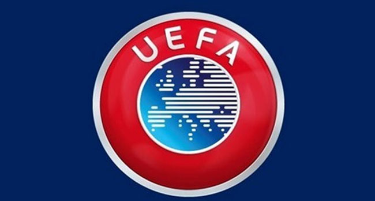UEFA announced on Monday that it has initiated disciplinary proceedings against the Football Association of Serbia (FSS) following allegations of inappropriate behavior by its fans during the Euro 2024 qualifier match against England. The charges leveled against the FSS include “throwing of objects” and “transmitting a provocative message unfit for a sports event,” according to a statement released by the European football governing body. The UEFA Control, Ethics and Disciplinary Body (CEDB) is expected to review and decide on the matter in due course.
The match, which took place on Sunday and resulted in a 1-0 victory for England, has become the focal point of a broader controversy involving both Kosovo and Serbia, who have lodged complaints against each other with UEFA. Serbia has accused a Kosovo journalist of allegedly making an Albanian nationalist sign, while the Kosovo Football Federation (FFK) has alleged that Serbian fans engaged in “racist messages” and displayed “flags, slogans and chants… with political, chauvinistic and racist messages against Kosovo.”
In its statement, the FFK condemned the actions of Serbian fans, describing the display of such messages at a significant event like Euro 2024 as “senseless and absurd.” The FFK has called for stringent disciplinary measures against the Serbian Football Association, emphasizing Serbia’s history as a “repeat offender” in such incidents.
The tensions between Serbia and Kosovo, both on and off the field, are deeply rooted in their tumultuous history. The conflict between Kosovo’s independence-seeking ethnic Albanian rebels and Serbian forces in the late 1990s resulted in a war that claimed approximately 13,000 lives, predominantly ethnic Albanians. Following the war, Kosovo declared independence from Serbia in 2008, a move that has been recognized by around 100 countries but remains unacknowledged by Serbia.

This fraught relationship frequently spills over into the sporting arena, reflecting the ongoing political and social tensions. Despite Serbia’s efforts to block Kosovo’s membership, Kosovo became a full member of both UEFA and FIFA in 2016, marking a significant milestone for the fledgling nation on the international sports stage. However, Kosovo did not qualify for the Euro 2024 tournament, a development that has further intensified the rivalry and the accompanying disputes.
The latest incident underscores the persistent friction between the two Balkan neighbors and the challenges that international sports bodies like UEFA face in maintaining discipline and decorum. UEFA’s disciplinary actions will be closely watched as they navigate the delicate political landscape and strive to uphold the integrity of the sport.
The outcome of these proceedings could have significant implications for future interactions between the two nations in the realm of international football. As the CEDB deliberates on the appropriate response, there is a growing call for measures that will prevent the recurrence of such behavior and promote a spirit of sportsmanship and mutual respect.
In the meantime, both the FSS and the FFK await UEFA’s decision, with the potential for severe repercussions depending on the findings and subsequent rulings. This incident serves as a stark reminder of the power of sports to both unite and divide, and the responsibility of governing bodies to foster an environment that prioritizes respect and fairness above all else.




